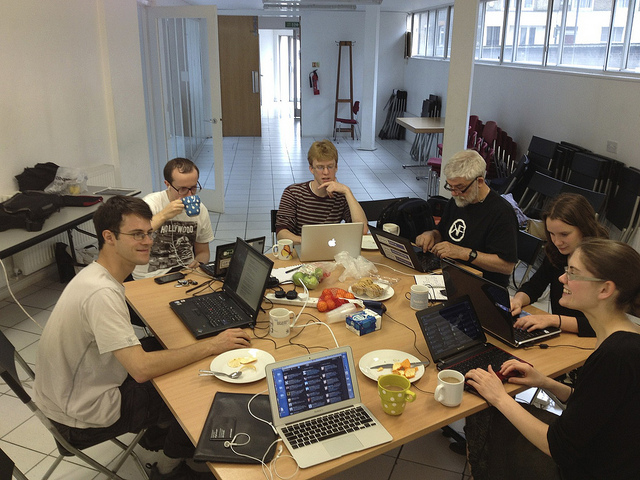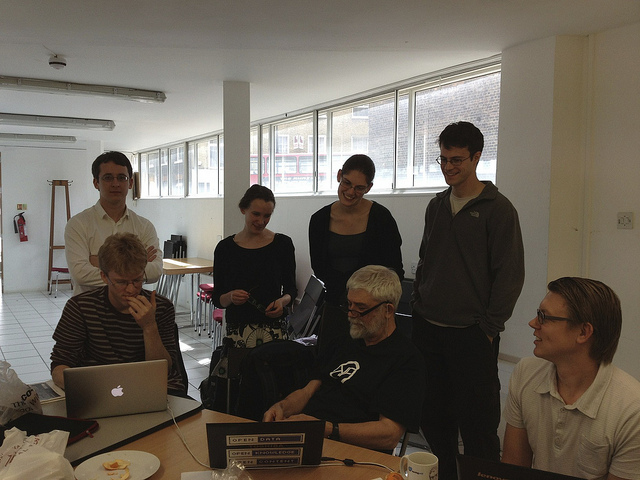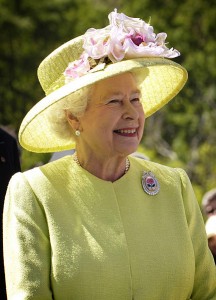This is a post by Jenny Molloy, coordinator of the OKFN Open Science Working Group, and Laura Newman, community coordinator. The blog post is also featured on the Open Science blog.

It was a day of ‘firsts’ for the Open Knowledge Foundation’s Open Science working group at their summer hackday on Saturday: the first hackday to be held by the group in the Centre for Creative Collaboration, the first trial run with Google Hangouts, the first introduction to booki.cc – and the first time Panton Fellow Ross Mounce had been so comprehensively soaked in a July downpour!
Despite the freak rainstorms, ten people joined the hackday in London, with many more joining online from across the world. Online participants may have missed out on the donuts, but thanks to Google Hangout they could see and hear us for much of the sprint. Multiple microphones in one room meant that the Hangout was suitably chaotic at times (!), but it added a fun dimension to the sprint, and is something we may explore further in future – with a better sense of what a Hangout can (and can’t) achieve.
Interspersed with a lot of laughter as the Hangout got off the ground, the hackers achieved a huge amount throughout the day:
PyBossa ages the Queen
At the suggestion of Francois Grey, co-creator of PyBossa, we worked up an app to crowdsource estimates of age. Based on the FlickrPerson app, PyBossa takes images of the Queen snapped at various points in her life, and asks users to guess how old she is.
The project is a demo of how distribution of cognitive tasks among members of the public could be used for research e.g. experimental psychologists could gather data on people’s ability to guess age, or technology development e.g. helping train algorithms for age estimation.
The current draft code for the app and shiny age selection bar can be found here. Feel free to contribute and create your own apps for the pyBOSSA platform – what problems could distributed thinking solve for you and your research?
The Open Research Data Handbook
A long-standing project that the Open Science working group has been keen to run is putting together an ‘Open Research Data Handbook’. Based on the successful concept of the Open Data Handbook and the Data Driven Journalism Handbook, the Open Research Data Handbook will aim to explain the what and why, and most importantly the how, of making research data open. It will be aimed towards doctoral students and researchers, and will also include supplementary sections to advise funders and research institutions on how best to support and promote open data in science.
During Saturday’s hackday, we refined the concept behind the Open Research Data Handbook, producing a skeleton contents page on booki.cc. Booki.cc seems to have an intuitive interface, and all edits and contributions to the Open Research Data Handbook are very warmly welcomed! The goal is to draft much of the content during booksprints at OKFest, and everyone is invited to collaborate and contribute from now onwards to make that a reality. Check out the contents page and keep watching this space…
Using the Datahub.io for Science
Peter Murray-Rust gave an introduction to the Datahub.io, outlining his vision for how it could be used for science, and giving a practical demonstration of how to upload a dataset (during which demonstration it became apparent just how much scientific data is still stored as a pdf!). After his demo, Peter got stuck in to generating an xlst style sheet to upload XML supplementary data files from the Open Access subset of UK PubMedCentral into the DataHub as CSV files to enable dynamic data visualisation using the DataHub’s in-built tools.
Plans are afoot to upload the data sets and other from Open Access publishers such as BioMedCentral to enable easy visualisation of the underlying data with minimal effort. The DataHub team have produced a great blog post on how to open up scientific data using CKAN/DataHub and will be looking into improving functionality so do comment on features you would like to see e.g. export of graphs as vector graphics.
Who Needs Access?
‘Who Needs Access?’ gathers stories from people who have been helped by open access or hindered by closed access to demonstrate how public access to research makes people’s lives better. We created a list of comments from newspaper articles on open access by authors with whom we’d like to get in touch and invite for a WNA? interview, so look out for new updates to the site and get in touch with jenny.molloy@okfn.org if you’d be keen to join the project as a blog editor!

And what we didn’t manage
Despite the productivity, a lot of the tasks that had been suggested for the day remain to be done. You can check out the ideas on the event pad.
Many of these projects are ongoing, and we warmly welcome contributions to all or any of them! If this has piqued your curiosity, please do sign-up to the open-science mailing list and introduce yourself. We hope that you may be able to join us for the next Open Science Hackday, which is scheduled to take place in late October. More details to follow!
In the meantime we also hope you might be able to join us at OKFest in Helsinki this September, where we’ll be holding a whole day of open science workshops and hacking on Tue 18 Sep, followed by a fantastic series of talks as part of the Open Research and Education Stream, 19-20 Sep.
Image of Queen: Public Domain image by NASA/Bill Ingalls from Wikipedia
Jenny coordinates the Open Science Working Group. She is a molecular biologist by training and in her day job she coordinates two programmes with a focus on open technologies for synthetic biology at the University of Cambridge: OpenPlant and the Synthetic Biology SRI. She is also a Director of ContentMine, a non-profit aiming to increase access to and use of content mining technologies in research.









